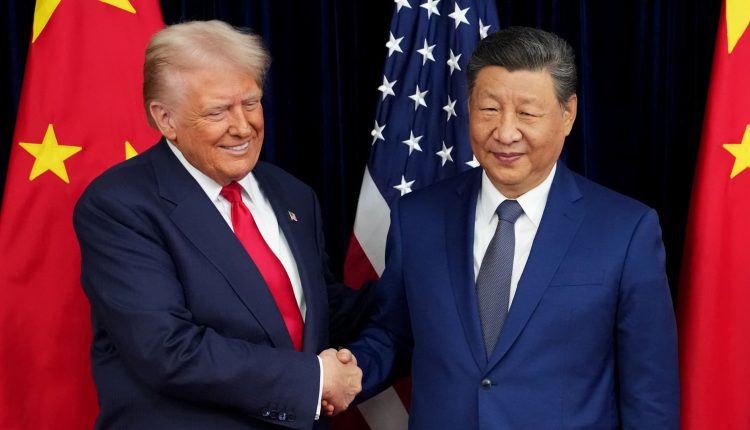U.S. President Donald Trump greets Chinese President Xi Jinping before a bilateral meeting at Gimhae Air Base on October 30, 2025 in Busan, South Korea.
Andrew Harnik | Getty Images News | Getty Images
Chinese President Xi Jinping said Beijing and Washington should be “partners and friends” during his meeting with U.S. President Donald Trump on Thursday to discuss trade and customs issues.
According to Chinese state media, the meeting ended after about an hour and 40 minutes. The two leaders shook hands before leaving the venue without making public comments.
This is the first time the two leaders have met in person since Trump’s second term began in January.
“We are going to have a very successful meeting,” Trump said during the photo op with Xi before entering the meeting. While he called Xi “a very tough negotiator,” Trump emphasized his relationship with the Chinese leader, saying, “We’ve always had a very good relationship.”
Asked whether the two leaders would strike a trade deal at the meeting, Trump said: “It could be. We will have a great understanding.”
In his opening speech, Xi said it is “normal for tensions to arise from time to time” between the world’s two leading economies and called on both sides to work together and ensure “the steady progress of the giant ship” of bilateral relations, according to a Chinese Foreign Ministry statement.
Xi also praised Trump’s efforts to resolve regional conflicts while emphasizing China’s role in promoting peace talks on various issues. The Trump administration indicated earlier this month that China was playing a limited role in ceasefire talks in Thailand and Cambodia.
“Although the meeting itself is not about peace, [Xi] “Above all, it’s trying to create an atmosphere conducive to a deal,” said Tianchen Xu, senior economist at the Economist Intelligence Unit.
The high-profile meeting comes as tensions between the world’s two largest economies have escalated this year. The latest escalation came this month when Beijing imposed export controls and Washington threatened to ban software-enabled exports to China.
The US has in recent days shared details of the deals it wants to reach with China – from restricting the flow of fentanyl into the US to divesting TikTok from its Beijing-based parent company ByteDance. Tariffs, technical restrictions and rare earths are also under discussion.
Beijing had been more cautious about the prospects of a deal, but in a possible sign of a thawing in relations, China bought its first shipments of U.S. soybeans in several months, Reuters reported on Wednesday.
The meeting between Trump and Xi could be more of a “tactical pause than a strategic breakthrough” as both sides spar over disagreements that lie at the heart of the U.S.-China rivalry, including technology controls, supply chain and security conflicts, said Han Shen Lin, China director at consultancy The Asia Group.
“A temporary ceasefire is better than an uncontrolled trade war,” Lin added.
Xi is in South Korea from Thursday to Saturday – his first state visit in 11 years – to attend the APEC economic leaders meeting in Gyeongju.
Shortly before the meeting began, Trump said in a post on Truth Social that he had ordered the Pentagon to resume nuclear weapons testing and claimed that the United States had the largest nuclear arsenal in the world, followed by Russia and China.
The comments were “brave and disruptive,” Lin said, adding that ahead of the meeting, Trump was “forcing the room to focus on U.S. influence.” “If there’s a trade victory, that’s brilliant; if it poisons the well, we’re in for even frostier peaks.”
Investors are cautiously awaiting headlines from Busan as the US-China trade war keeps investors on edge. Global markets rose sharply earlier in the week as optimism grew that the U.S. and China could move closer to a trade deal.
“A return to dialogue and engagement — regardless of short-term outcomes — is critical to advancing U.S.-China relations in the long term,” said Curtis Chin, chair of senior fellows at the Milken Institute and former U.S. ambassador to the Asian Development Bank.
However, “headline-grabbing agreements and meetings must be followed by well-executed implementation and fulfillment of commitments by both sides,” Chin said.


Comments are closed, but trackbacks and pingbacks are open.